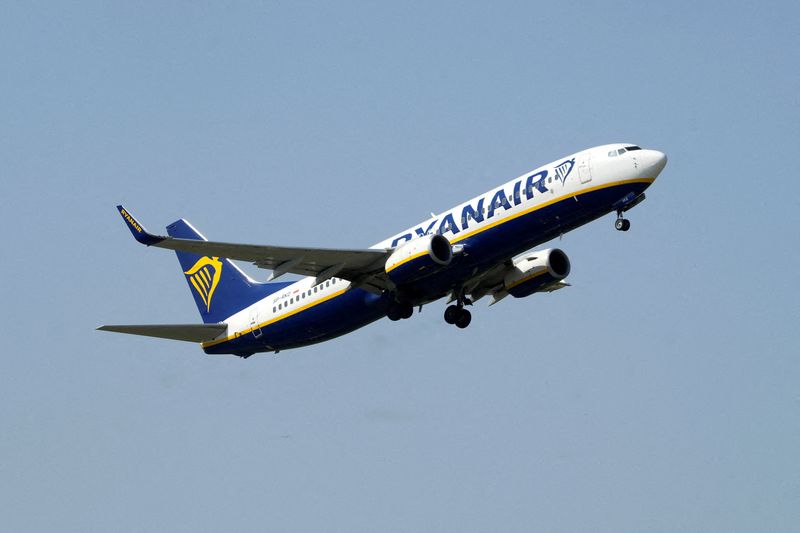By Valerie Insinna, Padraic Halpin and Tim Hepher
WASHINGTON/DUBLIN (Reuters) -Ireland's Ryanair sealed a multibillion-dollar deal for as many as 300 Boeing (NYSE:BA) jets on Tuesday, burying the hatchet after an 18-month public feud where prices threatened one of aviation's closest partnerships.
Europe's biggest low-cost carrier said it was placing a firm order for 150 of the largest version of Boeing's narrow-body jet family, known as the 737 MAX 10, with options for another 150.
The larger-than-expected deal delivers a boost to the 737 MAX, Boeing's best-selling jet whose deliveries have been depressed by a two-year safety crisis and post-COVID disruption.
Along with a massive Air India order inked in February for almost 500 jets, it highlights what Ryanair CEO Michael O'Leary termed "a dramatic rebound in orders" for Boeing and European rival Airbus as travel recovers from the pandemic.
It also marks a long-awaited truce after O'Leary broke off talks with Boeing last year and unleashed a barrage of criticism over pricing and delays in delivery of previously ordered jets.
O'Leary, whose sharp wit and hard-nosed demands have made the former accountant one of Europe's best-known business leaders, flew to Washington to celebrate the deal but offered an unusually timid summary following months of tough negotiations.
"I was expecting we would get the same pricing as we had the last time. I've had to eat some humble pie on that," O'Leary told Reuters, adding he was still pleased with the final price, which neither side disclosed.
Industry sources said Ryanair may have paid more than it initially bargained for after holding out for a better deal, but one noted O'Leary took pains to avoid bashing Boeing, which had been anxious for the deal not to be painted as over-generous.
Boeing shares rose more than 1% in midday trade. Ryanair closed up at 3.6%.
"I have been told to say there was a competitive discount ... although I didn't think (it) was particularly competitive," O'Leary joked to reporters, adding the order had risen by about 100 planes to help bring the two sides together.
Boeing Chief Executive Dave Calhoun countered that no premium was high enough for the jet as the two companies patched up their differences in a relaxed press conference.
Despite concessions on price, O'Leary said the new jets would allow Ryanair to almost double its annual traffic to 300 million passengers by March 2034 from the 168 million flown to end-March this year.
Some of that will come at the expense of rival carriers.
O'LEARY ACCEPTS MODERATELY HIGHER PRICES
Ryanair exclusively uses Boeing 737s for its mainline fleet and is one of Boeing's largest customers with more than 600 planes in its fleet or on order, according to its website.
On Monday, Reuters first reported that Ryanair was close to a major Boeing deal. Earlier on Tuesday, sources said the final deal could involve up to 200-300 jets including options.
Ryanair has long expressed interest in the 230-seat MAX 10, which faces runaway sales of the competing Airbus A321neo used by Ryanair rivals such as Wizz Air and has yet to be certified. But O'Leary had pledged not to overpay for the 30 extra seats.
Ryanair said the deal was worth $40 billion at list prices, though experts noted that this included options, which are not booked as orders, and typical discounts for firm orders run at more than 50%.
"We've had to accept a modestly higher price," O'Leary said. However, if Ryanair maintains its 94% or near-full load on flights aboard the larger MAX 10 jets, the extra 30 seats will "pay for the aircraft in their entirety," he said on Tuesday.
Industry sources said any price bump could at least partially be offset by compensation for delays, making it hard to measure who conceded most.
O'Leary has also often blasted Boeing over industrial problems. On Tuesday, however, he praised the catch-up effort and said he expects almost all 51 previously ordered jets earmarked for April to arrive by the end of July.
Newly ordered MAX 10s will be delivered from 2027 to 2033.
While Boeing's relief at winning the order was tangible, analysts said Ryanair had lost some advantage in negotiations and early slots as carriers including United Airlines placed significant orders for the MAX 10.
O'Leary dismissed this but acknowledged Ryanair would have had to wait until 2028-29 if negotiations had drawn out longer.

One person familiar with the deal said Ryanair could not afford to wait much longer as Indian airlines scoop up hundreds of narrow-body jets, threatening to squeeze Ryanair out of the market for in-demand large models for the rest of the decade.
"Ryanair operates a 737 fleet and is pretty locked in," with Airbus sold out for years and China years away from being able to supply the West, Agency Partners analyst Nick Cunningham said.